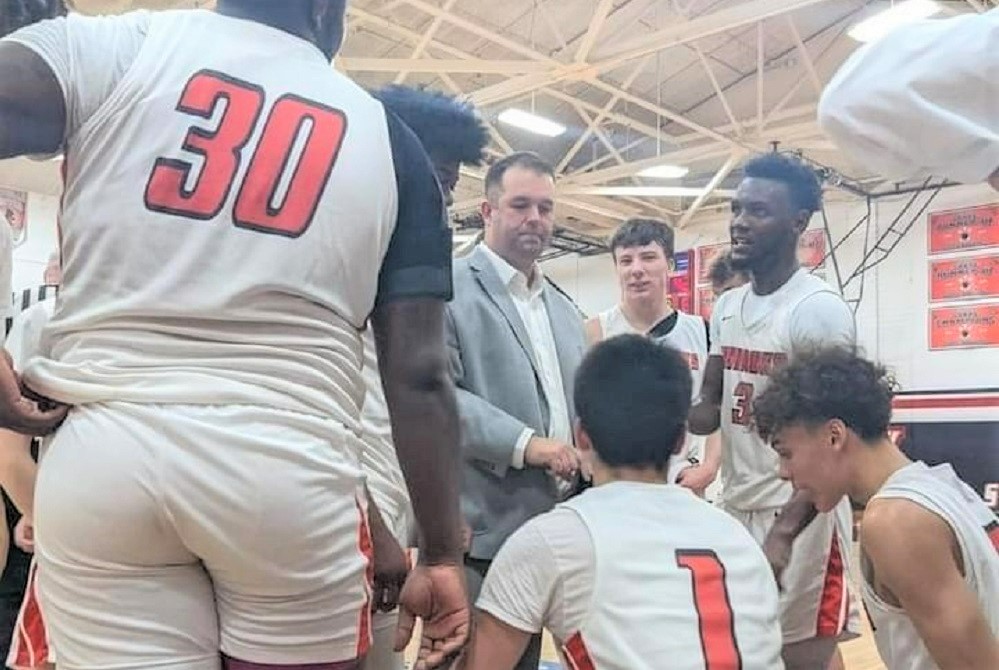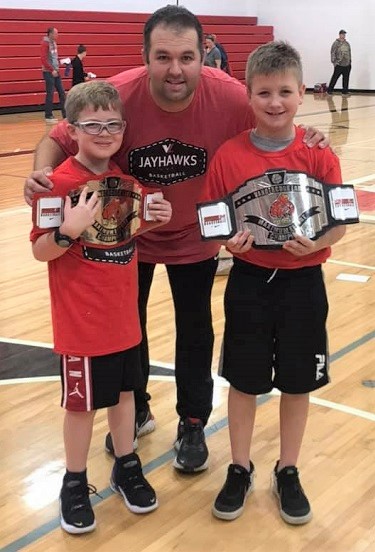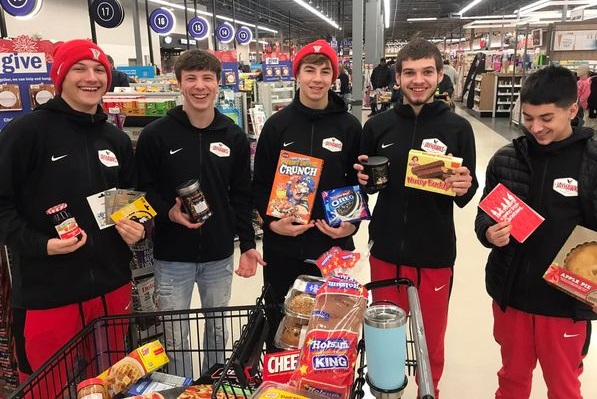
Detroit 'Longtime' Boys Coaches Down to Few
By
Tom Markowski
Special for Second Half
December 14, 2016
Gary Fralick considers himself one of the fortunate ones.
 Fralick, 66, is in his 32nd season as a head boys basketball coach. He retired from his teaching position in 2013. He started coaching at Redford Thurston in 1979, went to Royal Oak Kimball in 1984 and is in 23rd season as the head coach at Troy.
Fralick, 66, is in his 32nd season as a head boys basketball coach. He retired from his teaching position in 2013. He started coaching at Redford Thurston in 1979, went to Royal Oak Kimball in 1984 and is in 23rd season as the head coach at Troy.
Fralick might be lucky, but he is unquestionably rare. Fralick is believed to be one of three coaches in the Macomb/Oakland/Wayne area who has coached for more than 30 seasons.
There’s Dan Fife at Clarkston and Kevin Voss of Clinton Township Chippewa Valley, both of whom in their 35th seasons, all at the same school.
Another, Greg Esler at Warren DeLaSalle, is in his 30th season. He was the head coach at St. Clair Shores Lake Shore for seven seasons before going to DeLaSalle in 1994.
“We’re part of a dying breed,” Voss said.
It certainly appears so. Coaching longevity has taken on a different meaning recently. Twenty seems like a lot in these times, and in reality it is a long time. Twenty years or so ago, 20 years was normal. There’s a new normal, and 20 or 25 years isn’t it.
Many factors have contributed to this change. A person’s personal and family life often don’t coincide with the demands of coaching basketball. The responsibilities that come with coaching have increased. Some coaches say that to be an effective coach, it can be a 10- or 11-month job.
Two factors are at the forefront, and they are both financial. Coaches used to be educators as well as coaches. Yes, coaching can be viewed as teaching on the court, but at one time teaching in a classroom and coaching used to go hand in hand.
 Then there’s the subsidy coaches receive. It varies from school district to school district. Some make $4,000 a season, others can make $7,000. And it also costs money to run a program; unless the coach receives financial help from a booster club or parents, the money he or she receives begins to dwindle.
Then there’s the subsidy coaches receive. It varies from school district to school district. Some make $4,000 a season, others can make $7,000. And it also costs money to run a program; unless the coach receives financial help from a booster club or parents, the money he or she receives begins to dwindle.
But the most important factor is time.
“A tremendous amount of time is devoted to watching DVD or tapes,” Fralick said. “I know I’m dating myself with saying that. The point is, you’re watching a lot. There’s more scouting. And you don’t get paid much. Why don’t they stay as long as they used to? They get burned out. They want to spend more time with their families.
“You don’t see as many of the young coaches stay. Coaches don’t have the ambition to coach a long time. It’s not a profitable job. I don’t know what other coaches make. We used to compare what we made. Not anymore.
“Thirty years or more? I don’t see it happening. There’s the dual job thing. Things have changed. To me, it’s been a great job.”
To compensate for being away from home, Fralick brought his family with him. Sort of. He coached his son Gary, Jr., and Tim. Gary, a 1996 Troy graduate, played for his father his junior and senior seasons and Tim, a 1999 graduate, played four seasons on varsity. Fralick said he was even more fortunate to coach both on the same team (during the 1995-96 season).
Then there’s his wife, Sharon, who remains the scorekeeper.
“I’ve always had a passion for coaching and teaching,” Fralick said. “I love the game of basketball. I love the kids. There’s never a dull moment. It’s been a great ride.”
Vito Jordan has been around basketball all of his life. His father, Venias Jordan, was the boys head varsity coach at Detroit Mackenzie and Detroit Mumford before stepping down as a head coach only to return to the bench assisting his son the last six seasons.
Vito Jordan, 31, became a head coach at Detroit Osborn when he was 24. He started his coaching career the year before as an assistant to Henry Washington at Macomb College. Jordan went to Detroit Community after one season at Osborn and guided Community to its only MHSAA Finals appearance (Class B, 2013). He’s now in his fourth season as the head coach at Detroit Renaissance.
“I followed my father all of my life,” Jordan said. “I knew what I wanted to do when I was in college (Alma College). This is what I want to do the rest of my life.”
It’s different in Detroit. Schools close. Job titles change. Jordan, for instance, teaches at the Academy of Warren, a middle school in Detroit. It’s a charter school, not within the Detroit Public School system, therefore he receives his pay from two separate school systems (Renaissance is in the DPS).
There is a distinction. In some school systems coaches will receive a percentage – let’s say for argument sake, 10 percent – of their teaching salary to coach. Let’s say a person makes $60,000 a year to teach. He or she would then receive $6,000 to coach. If you coach two sports, that’s $12,000.
 Jordan is not privy to such a contract. Each job is separate. Jordan loves to coach, and he understands he must be a teacher to earn a decent living, and he’s content to continue on the path he is following. But he also knows that to make a good salary just coaching one must move on to the collegiate level like others have done.
Jordan is not privy to such a contract. Each job is separate. Jordan loves to coach, and he understands he must be a teacher to earn a decent living, and he’s content to continue on the path he is following. But he also knows that to make a good salary just coaching one must move on to the collegiate level like others have done.
“When there were coaches like my dad, Perry Watson (Detroit Southwestern), Johnny Goston (Detroit Pershing) and others, they all worked in the (Detroit Public) school system. Everyone was teaching. That was your career. None of them had aspirations of being a college coach. Not even Watson. Now everyone isn’t in the teaching profession. Maybe they do have a degree and maybe they don’t. The point is, most aren’t teachers. I can count on one hand those (in Detroit) who have their teaching certificate and coach.”
Jordan noted such successful PSL coaches like Derrick McDowell, Steve Hall and Robert Murphy who left high school to pursue a coaching career in college. Murphy guided Detroit Crockett to the Class B title in 2001 and is now the head coach at Eastern Michigan. McDowell has had two stints as a collegiate assistant coach, most recently at EMU. He’s since returned to coach at Detroit Western. Hall coached Detroit Rogers to three consecutive Class D titles (2003-05) before going to Duquesne University and Youngstown State as an assistant coach. Hall returned to Detroit last season and is in his second season as head coach at Detroit Cass Tech.
Jordan said they left high school to challenge themselves professionally, among other considerations. Voss said there are variables that influence how long a person lasts, in one school district or in coaching in general, that didn’t exist 20 years ago.
“Athletics have become pervasive in high school,” he said. “The whole booster situation you find in college is here. You can be winning but not winning enough. It’s a trickle down affect.
“Coaches complain about parents. Parents complain about playing time. High school sports is not as pure as it once was. Winning is way more important now. Now a coach comes in with a three-year window. You can have one or two down years, and the third you’d better win.
“Then there’s the pressure on your family. I’ve been lucky. My wife and I have had the players over for team dinners. We create a family atmosphere. It’s a change of society. I don’t envy the young coaches coming in.”
Community involvement has always been a priority for Voss. To keep a hand on the pulse, Voss heads the elementary basketball program within the Chippewa Valley school district. Games are held on Saturdays, and approximately 750 students take part.
“You have to have the right fit,” he said. “I’m in the right spot. You coach for different reasons when you get older. I’m enjoying the game. There’s a different level of satisfaction.”
 Tom Markowski is a columnist and directs website coverage for the State Champs! Sports Network. He previously covered primarily high school sports for the The Detroit News from 1984-2014, focusing on the Detroit area and contributing to statewide coverage of football and basketball. Contact him at [email protected] with story ideas for Oakland, Macomb and Wayne counties.
Tom Markowski is a columnist and directs website coverage for the State Champs! Sports Network. He previously covered primarily high school sports for the The Detroit News from 1984-2014, focusing on the Detroit area and contributing to statewide coverage of football and basketball. Contact him at [email protected] with story ideas for Oakland, Macomb and Wayne counties.
PHOTOS: (Top) Troy boys basketball coach Gary Fralick, left, is in his 32nd season coaching. (Middle) Detroit Renaissance boys coach Vito Jordan is following in the coaching footsteps of his father, Venias. (Below) Chippewa Valley boys coach Kevin Voss, left, is in his 35th season at his school. (Top and below photos courtesy of C&G Newspapers; middle photo courtesy of Detroit Public School League.)

Accomplished Official Also at Home in Huddle Guiding Vandercook Lake Comeback
By
Doug Donnelly
Special for MHSAA.com
January 11, 2022
JACKSON – Cory Ray is right where he is supposed to be.
 The second-year Vandercook Lake boys basketball coach has the Jayhawks off to their best start in years, setting up a key Cascades Conference battle for tonight against another undefeated team, Napoleon.
The second-year Vandercook Lake boys basketball coach has the Jayhawks off to their best start in years, setting up a key Cascades Conference battle for tonight against another undefeated team, Napoleon.
After spending a decade as a basketball referee in southeast Michigan, Ray has thrown his passion into coaching. It’s been an interesting transition, but one he is thoroughly enjoying.
“I never thought I would switch over to being a coach,” Ray said. “It’s been crazy, but I’m enjoying it.”
Ray is a 2003 Vandercook Lake graduate. He played basketball for the Jayhawks but soon found his calling as an umpire in baseball and basketball official. He has climbed the ladder as an umpire; he worked the MHSAA Finals a few years ago, moved up to NAIA and Division III and now regularly is called for Division I college games.
His basketball career took a turn when Vandercook Lake needed a junior high coach.
“I started talking to them about it,” Ray recalls. “I started doing that, and coaching just grew on me.”
When the Jayhawks varsity position opened in 2017, he applied, but didn’t get the job. He wasn’t discouraged.
“I didn’t get it because of a lack of experience,” he said.
He kept coaching at the junior high level. Before the pandemic, he finally got his chance.
 “I don’t want a varsity job anywhere but Vandercook Lake. I always figured if I am going to put that kind of investment and time into a head coaching position, I want it here, where I went to school, where my kids go to school,” he said. “If I’m going to do it, I want to do it in the place where I am from.”
“I don’t want a varsity job anywhere but Vandercook Lake. I always figured if I am going to put that kind of investment and time into a head coaching position, I want it here, where I went to school, where my kids go to school,” he said. “If I’m going to do it, I want to do it in the place where I am from.”
Ray, 37, lives in the district and his wife Sarah is the Jayhawks cheer coach. One of their daughters is in the eighth grade.
He’s thrown himself into the job and helped the Jayhawks taste success after a couple of down years. The 2017-18 team won only two games, and the 2019-20 team just four.
Last year Vandercook Lake went 9-9 in the shortened season, encouraging Ray about this winter. The seniors last year, he said, helped bring along the younger players.
“I had a great relationship with them,” he said. “They really set the foundation for this year’s team.”
The 6-0 start, however, is more than even Ray could have imagined. The 12-player varsity roster includes 11 seniors.
“I knew we could be good,” he said. “I wasn’t sure how good.”
One of the reasons Ray was confident about this season was the return of 6-foot senior Demarion Smith. “It’s always a good starting point when you have someone who averaged 21 points a game come back,” Ray said.
Smith’s presence gives opposing defenses plenty to think about. But he’s far from being the only scoring threat on the roster.
“We have shooters everywhere,” Ray said.
Anthony Jimenez has had some big games already. Jermaine Buckner is the true point guard who runs the show. Tyrell Showers and Avery Pierce are on the verge of breakout seasons.
Against Manchester last week, Buckner nearly recorded a triple-double with 26 points, 13 rebounds, eight assists and five steals. An earlier game, he hit four triples in the first half to keep the team close before the others got hot.
“Doing what he does really opens up the floor for Smith and Jimenez,” Ray said.
Since Ray knew he had an offense to count on, he spent the summer and preseason focusing on defense.
 “We knew our focus had to be on the defensive end. We knew that had to be good. Plus, we do a nice job of crashing the boards,” he said. “If we can hold teams in the 30s and 40s, it’s going to be hard to lose. We have a couple kids on the verge of being big-time players for us. I see a lot of growth on the floor.”
“We knew our focus had to be on the defensive end. We knew that had to be good. Plus, we do a nice job of crashing the boards,” he said. “If we can hold teams in the 30s and 40s, it’s going to be hard to lose. We have a couple kids on the verge of being big-time players for us. I see a lot of growth on the floor.”
The community has bought into the team, too, supporting the Jayhawks at every turn, from being in the stands to helping the team give back.
“The thing that I’m most happy and impressed with is how the community has responded and supported,” he said.
The transition from referee to coach gives Ray a different perspective.
“Being a high school basketball coach has made me a better umpire,” he said. “Being on both sides, you can see the investment the coaches put in and why they care so much. It definitely gives you a different perspective. You start to see both sides of it. You get why the coaches are so intense, so into the games.”
It’s still early in the season, but tonight’s matchup between the Jayhawks (6-0) and Napoleon (6-0) has the makings of a beauty. It could be viewed as a possible changing of the guard in the conference, lately dominated by Hanover-Horton, which has won or shared league titles seven of the past eight seasons but is off to just a 2-4 start.
Vandercook Lake last won Cascades Conference titles in 2011 and 2012. Napoleon hasn’t won one since 2008-09.
“You love to see someone from your area, your conference, do well. But, at the same time, you like to see someone else give it a run,” Ray said. “We just have to continue to play with the same identity we’ve been playing.”
 Doug Donnelly has served as a sports and news reporter and city editor over 25 years, writing for the Daily Chief-Union in Upper Sandusky, Ohio from 1992-1995, the Monroe Evening News from 1995-2012 and the Adrian Daily Telegram since 2013. He's also written a book on high school basketball in Monroe County and compiles record books for various schools in southeast Michigan. E-mail him at [email protected] with story ideas for Jackson, Washtenaw, Hillsdale, Lenawee and Monroe counties.
Doug Donnelly has served as a sports and news reporter and city editor over 25 years, writing for the Daily Chief-Union in Upper Sandusky, Ohio from 1992-1995, the Monroe Evening News from 1995-2012 and the Adrian Daily Telegram since 2013. He's also written a book on high school basketball in Monroe County and compiles record books for various schools in southeast Michigan. E-mail him at [email protected] with story ideas for Jackson, Washtenaw, Hillsdale, Lenawee and Monroe counties.
PHOTOS (Top) Vandercook Lake coach Cory Ray huddles with his team during a timeout this season. (Middle) Ray and two of the community’s youth players show off championship hardware. (Below) Jayhawks fill a grocery cart during a Christmas shopping trip to benefit a local family. (Photos courtesy of the Vandercook Lake boys basketball program.)

